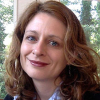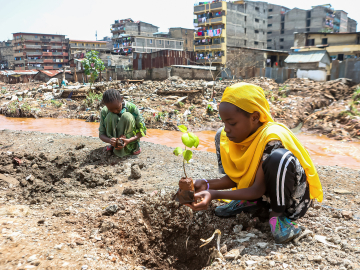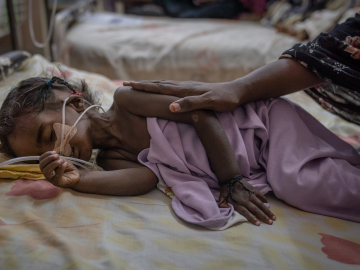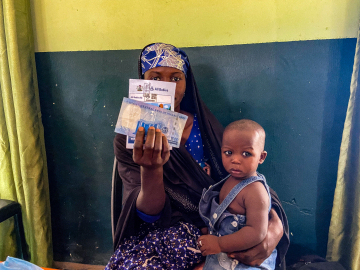Lifting up Youth: Q&A with Jean Christophe Rusatira
As a medical student in Rwanda, Jean Christophe Rusatira grew determined to help the many street kids he encountered near his university. Rusatira’s quest to help youth find better opportunities sparked his career-shaping interest in public health, and ultimately led to his recognition as a 120 Under 40 winner. The program, organized by the Bill and Melinda Gates Institute for Population and Reproductive Health at the Johns Hopkins Bloomberg School of Public Health, shines a light on the “positive disruptions” made by young leaders in family planning.
Rusatira became a general practitioner in Muhima District Hospital in Rwanda, but he kept gravitating toward public health initiatives. He founded a youth-led NGO, Healthy People Rwanda, focused on health education—particularly surrounding sexual and reproductive health. He is also the co-director of Research and Development for the International Youth Alliance for Family Planning (IYAFP), and he recently graduated from the MPH program at the Johns Hopkins Bloomberg School of Public Health, where he was in the prestigious Sommer Scholar program. Now, he works as a program specialist for the Gates Institute, and shared some thoughts with GHN about his path as part of GHN’s special series.
Growing up in Rwanda, what inspired you to become a doctor, and later, what prompted you to earn your MPH?
I grew up in a family of 9 in an area where large families—typically at least 7 children—are the norm, and there were never enough doctors. Beyond the sheer need, I wanted to contribute to the overall health of my community, and especially to provide clinical care to those in need. However, I later realized that clinical care alone might not be enough—especially for a community with poor health literacy and a broad burden of diseases, worsened by poverty. I decided to pursue an MPH to better understand the “why” behind these health challenges, and to be able to develop evidence-based solutions. However, I also saw an immediate need to shore up health literary and create opportunities for others interested in improving the health of children and youth. That’s what inspired me to launch Healthy People Rwanda.
What are the biggest obstacles Healthy People Rwanda faces in advancing sexual and reproductive health in Rwanda?
Healthy People Rwanda faces 2 main challenges: First, the main local players in this domain do not integrate youth-led organizations—despite the presence of well-qualified, committed, enthusiastic local youth—frustrating efforts to develop collaborative work. Second, as a local organization with no local grant opportunities, Healthy People Rwanda is dependent upon on external funding, and such opportunities are scarce.
How did you get interested in the demographic dividend?
Having spent more than 5 years mainly focusing on improving health literacy among youth, I realized that societies with large youth populations, like Rwanda, need more than health literacy. Proper investment is needed for them to be productive and satisfy their own needs, the needs of their families, and save for their future. This made great sense to me, especially since, as a clinician, I frequently observed young and old patients unable to afford high-quality drugs—despite being covered by Rwanda’s universal health care insurance which, realistically, cannot cover all health care costs.
What are the smartest investments that should be made in youth now to pave the way for a demographic dividend?
Investing in young people is the smartest thing that countries, organizations and foundations can focus on. Investing in youth, however, does not mean giving them handouts. Given opportunities, young people are capable of helping themselves. While many organizations raise emphasize the importance of experience, young people should be given the opportunities to work with their peers directly—not through big organizations that may miss crucial, life-changing details. I was once surprised when a young 13-year-old asked me for advice on where to obtain a small-size condom. I had never thought of that, and turned to other professionals—with long experience in family planning—who also could not help. This simple experience demonstrated to me that years of experience may not necessarily be the answer. A better strategy might be supporting youth-owned programs and developing frameworks of providing technical assistance if needed.
Now that you’re working in Baltimore, what do you miss the most about your home country?
My family; it is not easy to live far from them all. And of course, when the winter comes, I cannot stop thinking of the Rwandan equatorial climate.
How will you bring your experiences working in Rwanda to bear on preparations for the 2018 International Conference on Family Planning?
During the 3 years that I worked as a clinician, I spent time working with the family planning team and gained hands-on experience with the government’s strategies and services that led to a successful fertility decline and high uptake of modern contraceptives. As an advocate, I was involved in sexual and reproductive health literacy and policy advocacy. I will draw on this experience to inform other team members working on the 2018 International Conference on Family Planning, to help make this conference a learning experience for all participants.
Read other profiles in GHN’s 120 Under 40 series here.
This interview has been edited for clarity and length.
Join the thousands of subscribers who rely on Global Health NOW summaries and exclusive articles for the latest public health news. Sign up for our free weekday enewsletter, and please share the link with friends and colleagues: Subscribe to GHN
Jean Christophe Rusatira. Image courtesy of the Bill & Melinda Gates Institute for Population and Reproductive Health





